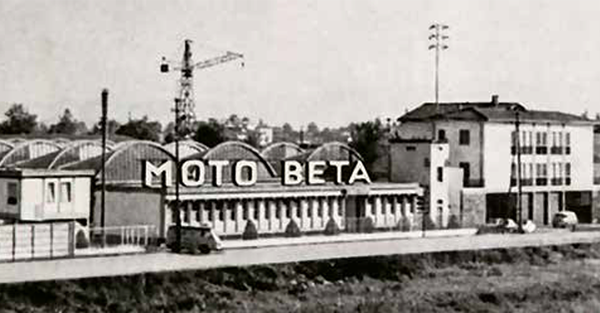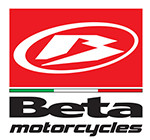Beta History
THE HISTORY OF BETA MOTORCYCLES
An Italian Legend
Beta motorcycles have always been connected with the history and evolution of life on two wheels. The company was founded in Florence in 1905 under the name "Società Giuseppe Bianchi", for building handmade bicycles. At the end of the 1940s, with the changes that had taken place in Italian society and the development of motorized transport, the company switched to motorcycle production. The simple expedient of attaching an engine with a roller transmission to one of its bicycles, a typical example of Italian creativity, resulted in the first motorbike produced by the Tuscan firm.

Early Beta Headquarters
Present Beta Headquarters
![]()

The two men who ran the company, Enzo Bianchi and Arrigo Tosi, joined their initials to form the brand-name Beta,
and the company’s bikes have been sold under this name ever since.
1950 - 1969
The CERVO 48 was the first model to be put on the market. It featured transmission by a rubberized roller acting directly on the rear tire, alongside a chain for starting and final drive. In 1948, the company launched the CIGNO, which was powered by a single-cylinder 48cc motor. Its double cradle frame, telescopic forks and shock absorbers gave it a very sporty look. In 1950, Beta entered the more demanding 125cc class with the production of the ITAL-JAP 125, fitted with pressed-steel girder forks and telescopic rear shocks.
Another model launched in the ’50s was the M.T. 175: derived from competition bikes, the M.T. used a two-stroke single-cylinder engine capable of reaching 81 mph. A touring version was subsequently developed, the S.V 175.

A wide range of road bikes was produced in this period, with a tendency towards sportiness. The ASTRO 98, MERCURIO 150, FOLGORE 175 and ORIONE 200 are only some of the models fitted with single-cylinder four-stroke pushrod engines, delivering quite a respectable performance for the time. In the 1960s, Beta began in-house production of the motors which from then on would be fitted across the range. The development of new models went hand in hand with a commitment to competition: the ’50s saw Beta’s first successes in hill climbing, Motogiro and in the Milan-Taranto race, with its 175cc models.

1970 - 1979
In the ’70s, with the emergence of the off-road sector, Beta began to specialize more and more in the production of off-road vehicles. This specialization has always been accompanied by a matching commitment in the area of competition, the test-bench for excellence in the production of Beta motorcycles - initially in motocross, enduro, and later in trials during the early ‘80s.

1980 - 1989
Beta’s close involvement with motorcycle sport has been marked over the years by a series of successes. There were the early victories in motocross in the late ’70s and early ‘80s from riders by the names of Jim Pomeroy, Gilbert De Roover, and Italian rider Ivano Bessone. In the mid 1980’s Beta began to focus on building Trials motorcycles and had immediate success in the World Trials Championships won by the great Jordi Tarres and the three consecutive world titles awarded to Dougie Lampkin (1997-1999). Then there were the six Indoor World Championships, including the one which Albert Cabestany won in 2002, and finally five European titles.

1990 - 1999
In 2004, Beta returned to four-stroke enduro with a major investment both in product development and in its presence on the competition track. In this new field, Beta remains faithful to its mission to inspire motorcyclists in such a fashion where the quality of the riding experience is just as important as the quality of the product. Today, many of the other motorcycle manufactures depend on robots to construct their products. Beta relies on the experience and passion of craftsmen to build their motorcycles.

2000 - 2009
Far reaching changes within the company meant that it became possible to focus on foreign markets, while the number of models in the range was increased partly as a result of the important working relationships with KTM and Suzuki. At the same time, success in competition proved to be extremely useful as a means of developing business.

2010 - Present
A decade marked by major changes. The scooter market was constantly evolving, sales of enduro bikes were increasing worldwide, while trial bikes were still selling but in much smaller numbers. Beta was now producing all of its two and four stroke engines inhouse. The company’s great commitment to sport brought more world championship wins including the manufacturers’ titles, which were even more prestigious and which the company had never won before.


